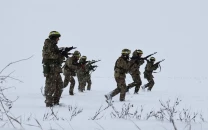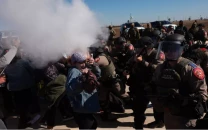Israeli annexation plan 'very dangerous': Russia
Annexation would most likely provoke a new round of violence in Palestine, says deputy foreign minister

Annexation could set off discontent and violence, warns Russia's deputy foreign minister. PHOTO: Anadolu Agency
In the near future the new coalition government of Israel "may begin practical steps" to implement its stated plans to annex Palestinian territories, said Mikhail Bogdanov, Russia’s deputy foreign minister.
“We believe that such a development would be very dangerous. We agree with the assessments and warnings in this regard, which are reflected in the latest decisions of the Arab League on this issue.”
The Arab League has condemned the scheme as a “war crime.”
Speaking to Egyptian daily Al-Ahram, Bogdanov warned: "Annexation of part of the Palestinian territories by Israel would not only put an end to the prospect of a two-state solution, but would most likely provoke a new round of violence in Palestine, as well as further inflame the acute discontent of the Arab street."
Russia remains committed to a two-state solution on the basis of international law, and wants to see direct Israeli-Palestinian talks launched under UN auspices, Bogdanov added.
Encouraged by the US’ so-called “Deal of the Century,” Israel is expected to formally annex parts of the West Bank on July 1, as agreed to between Prime Minister Benjamin Netanyahu and Benny Gantz, the head of the Blue and White party.
The plan has drawn international condemnation and outrage.
The West Bank, including East Jerusalem, is seen as occupied territory under international law, thus making all Jewish settlements there – as well as the planned annexation – illegal.



















COMMENTS
Comments are moderated and generally will be posted if they are on-topic and not abusive.
For more information, please see our Comments FAQ